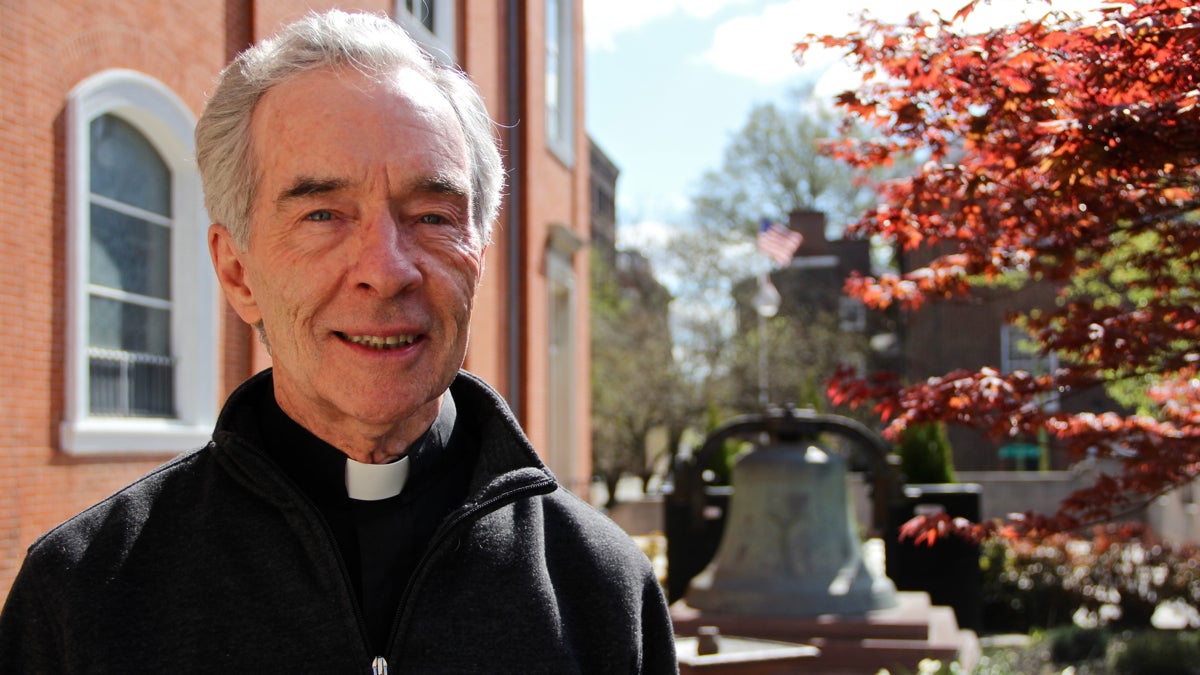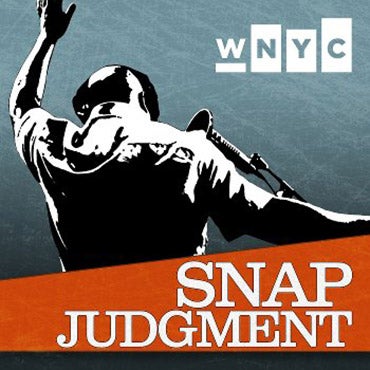Philly priest uses fiction to break Catholic Church’s ‘wall of silence’

Father Paul Morrissey walks in the Healing Garden at St. Augustine's in Philadelphia. He is the author of 'The Black Wall of Silence.' (Emma Lee/WHYY)
It’s Father Paul F. Morrissey’s duty, as an Augustinian priest, to help relieve the pain and suffering of others. But what if the pain and suffering is within the Catholic Church itself? That is the central issue Morrissey addresses in his provocative novel, “The Black Wall of Silence.”
“Prime Time” is a bi-weekly series featuring people over 50 in the Greater Philadelphia area who are taking on new challenges. They are starting new businesses, dedicating themselves to activism, and becoming a part of the change they wish to see. Email us to nominate someone.
—
It’s Father Paul F. Morrissey’s duty, as an Augustinian priest, to help relieve the pain and suffering of others. But what if the pain and suffering is within the Catholic Church itself? That is the central issue Morrissey addresses in his provocative novel, “The Black Wall of Silence.”
The cover shows a priest muffled by his own collar. “We are all muffled in some way, torn between loyalty and honesty,” says Morrissey who, like the central character of his novel, serves as a prison chaplain and spiritual director.
In his novel, a gay priest discovers that the Church’s cover-up of sexual abuse may result in a life sentence without parole for a victim.
“In the novel, I try to show the parallel between the Church and the prison system,” says Morrissey. “Bishops have protected the Church at all costs, even if it means, at times, relocating an admitted pedophile. To survive, whether in a prison or in the Church, you have to follow the loyalty code or open yourself to retribution. In my novel, I attempt to pull back the curtain of silence on these issues.”
The conflict between Morrissey’s fictional priest and a bishop builds up this battle between honesty and loyalty in a courtroom climax. The novel’s main character, Father Zach, says, “If I remain silent about a problem in the prison or the Church, I’m rewarded for being a member of the team. But if I ask a question, I’m seen as a traitor.”
“Father Zach realizes he lives in two prisons — the Catholic Church, and Riker’s Island, where he serves as a prison chaplain,” says Morrissey, “This loyalty-versus-honesty theme is universal. Readers will be able to identify with the characters, whether they are Christian, Jewish or Muslim, because we all tend to censor ourselves in some way in order to fit in and be accepted. The question my books asks is: Can Catholics, or anyone, speak our truth, or must we hide?”
Growing up in Upper Darby, the second-oldest of 14 children, Morrissey understood the importance of making his voice heard from an early age. “If I didn’t stand up for myself, one of my siblings would’ve grabbed food right off my plate,” he says.
Gay priests? Pedophiles? Sexual abuse? Many would prefer to sweep these taboo subjects under the rug, especially in light of the Pope’s upcoming visit.
“I am excited about Pope Francis’ visit in September, ” says Morrissey. “I remember when Pope John Paul II visited in the 1980s, and I ran up City Avenue hoping to catch sight of his motorcade. Francis represents a strikingly different approach to the papacy. He speaks to the crucial issue of our times with a grin and a pastoral heart we can feel. And he has asked us to discuss these issues in preparation for the World Meeting of Families in Philadelphia this autumn.
“Pope Francis has urged us to ‘Speak clearly … You need to say all that you feel with honesty,'” says Morrissey. But what about the pain his novel exposes?
“I love the Church. I know some people will feel hurt to bring these issues out into the open, but there has to be pain for the healing process to begin. It’s like a boil. It won’t heal until you lance it,” says Morrissey.”We need to win back people’s trust and the only way we can do this is to be honest.”
One of Morrissey’s goals is to separate pedophilia from homosexuality. “Pedophiles, whether they are heterosexual or homosexual, are fixated sexually on children and teenagers. Gays and lesbians are attracted to their peers. The Church has even confused these issues,” says Morrissey.
“Celibacy does not cause anyone to become a pedophile or to become gay or a lesbian. Removing gay priests from the Church will not stop the problem. Neither will re-locating known pedophiles. The Church has strict rules now for reporting any sexual abuse, yet some bishops still want to cover it up.”
After serving as a hospice chaplain for many years, Morrissey became a chaplain in the Philadelphia prison system at the age of 65. “Prisoners’ voices have been silenced just the way many in the Church feel silenced,” he says. “There are currently 8,000 inmates being warehoused in Northeast Philadelphia, invisible from I-95, most of them poor blacks, Hispanics and addicts. Many of them can’t afford bail. Their trials are often delayed.”
He now coordinates a weekly support group for ex-inmates and their families at St. Rita’s in South Philadelphia. “It’s even harder for them when they get out,” he says.
—
Father Paul Morrissey is also the author of “Let Someone Hold You: The Journey of a Hospice Priest” (Crossroad, 1994) which won the Catholic Press Award and the Christopher Award. Currently, he is the editor of “Voices From Prison and the Edge,” a quarterly newsletter for prisoners, their families and others affected by crime.
Want to add your voice to this lively discussion? Father Morrissey will be appearing at a book signing and Q&A hosted by Chestnut Hill College on Tuesday, May 12, 7 – 9 p.m. at SugarLoaf Chateau in Chestnut Hill. All are invited to attend.
WHYY is your source for fact-based, in-depth journalism and information. As a nonprofit organization, we rely on financial support from readers like you. Please give today.

